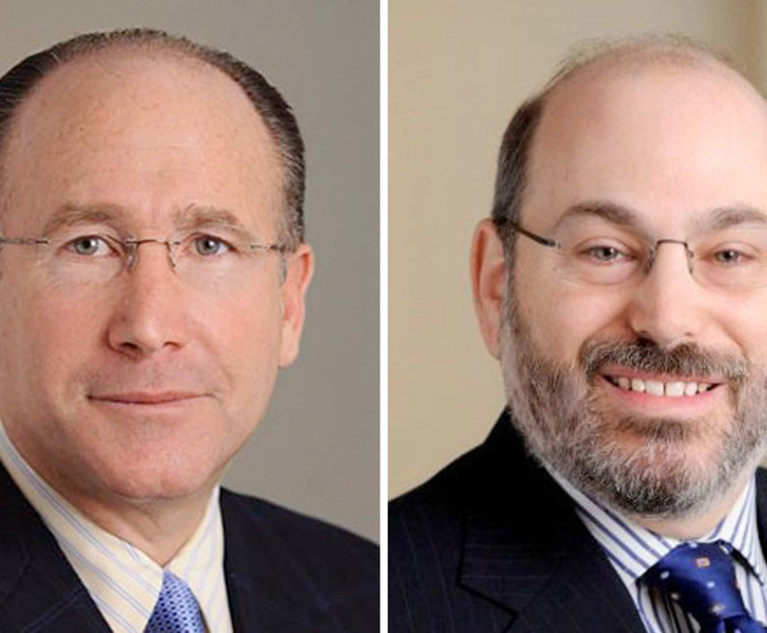 Jeffrey B. Steiner and Scott A. Weinberg
Jeffrey B. Steiner and Scott A. Weinberg Mortgage Foreclosures, Acceleration and the Statute of Limitations
In their Real Estate Financing column, Jeffrey Steiner and Scott Weinberg discuss the status of law relating to acceleration and the statute of limitations amid foreclosure actions as clarified in the recent New York's Court of Appeals case 'Freedom Mortgage Corporation v. Engel.'
September 14, 2021 at 10:14 AM
6 minute read
When a borrower defaults under a mortgage loan, in order to pursue collection of the entire debt (or foreclose on such basis) a lender must properly accelerate the loan, with such acceleration serving to trigger a six-year statute of limitations for lender to commence an action to foreclose the related mortgage. A recent decision issued by New York's Court of Appeals, Freedom Mortgage Corporation v. Engel (37 N.Y.3d 1, 2021), which is being heralded as a landmark case, clarifies the status of the law relating to acceleration and the statute of limitations in several respects, which this article will describe.
It has long been settled that the six-year statute of limitations to foreclose a mortgage begins to run upon acceleration of the related debt. The issue arises, however, as to exactly when such acceleration occurred. Because mortgage loan documents typically provide that acceleration will occur at the election of the lender (as opposed to occurring automatically upon an event of default), such election must be demonstrated by an "unequivocal overt act."
This content has been archived. It is available through our partners, LexisNexis® and Bloomberg Law.
To view this content, please continue to their sites.
Not a Lexis Subscriber?
Subscribe Now
Not a Bloomberg Law Subscriber?
Subscribe Now
NOT FOR REPRINT
© 2025 ALM Global, LLC, All Rights Reserved. Request academic re-use from www.copyright.com. All other uses, submit a request to [email protected]. For more information visit Asset & Logo Licensing.
You Might Like
View All
Tortious Interference With a Contract; Retaliatory Eviction Defense; Illegal Lockout: This Week in Scott Mollen’s Realty Law Digest

Court of Appeals Provides Comfort to Land Use Litigants Through the Relation Back Doctrine
8 minute read
Piercing the Corporate Veil; City’s Authority To Order Restorations; Standing: This Week in Scott Mollen’s Realty Law Digest
Law Firms Mentioned
Trending Stories
Who Got The Work
J. Brugh Lower of Gibbons has entered an appearance for industrial equipment supplier Devco Corporation in a pending trademark infringement lawsuit. The suit, accusing the defendant of selling knock-off Graco products, was filed Dec. 18 in New Jersey District Court by Rivkin Radler on behalf of Graco Inc. and Graco Minnesota. The case, assigned to U.S. District Judge Zahid N. Quraishi, is 3:24-cv-11294, Graco Inc. et al v. Devco Corporation.
Who Got The Work
Rebecca Maller-Stein and Kent A. Yalowitz of Arnold & Porter Kaye Scholer have entered their appearances for Hanaco Venture Capital and its executives, Lior Prosor and David Frankel, in a pending securities lawsuit. The action, filed on Dec. 24 in New York Southern District Court by Zell, Aron & Co. on behalf of Goldeneye Advisors, accuses the defendants of negligently and fraudulently managing the plaintiff's $1 million investment. The case, assigned to U.S. District Judge Vernon S. Broderick, is 1:24-cv-09918, Goldeneye Advisors, LLC v. Hanaco Venture Capital, Ltd. et al.
Who Got The Work
Attorneys from A&O Shearman has stepped in as defense counsel for Toronto-Dominion Bank and other defendants in a pending securities class action. The suit, filed Dec. 11 in New York Southern District Court by Bleichmar Fonti & Auld, accuses the defendants of concealing the bank's 'pervasive' deficiencies in regards to its compliance with the Bank Secrecy Act and the quality of its anti-money laundering controls. The case, assigned to U.S. District Judge Arun Subramanian, is 1:24-cv-09445, Gonzalez v. The Toronto-Dominion Bank et al.
Who Got The Work
Crown Castle International, a Pennsylvania company providing shared communications infrastructure, has turned to Luke D. Wolf of Gordon Rees Scully Mansukhani to fend off a pending breach-of-contract lawsuit. The court action, filed Nov. 25 in Michigan Eastern District Court by Hooper Hathaway PC on behalf of The Town Residences LLC, accuses Crown Castle of failing to transfer approximately $30,000 in utility payments from T-Mobile in breach of a roof-top lease and assignment agreement. The case, assigned to U.S. District Judge Susan K. Declercq, is 2:24-cv-13131, The Town Residences LLC v. T-Mobile US, Inc. et al.
Who Got The Work
Wilfred P. Coronato and Daniel M. Schwartz of McCarter & English have stepped in as defense counsel to Electrolux Home Products Inc. in a pending product liability lawsuit. The court action, filed Nov. 26 in New York Eastern District Court by Poulos Lopiccolo PC and Nagel Rice LLP on behalf of David Stern, alleges that the defendant's refrigerators’ drawers and shelving repeatedly break and fall apart within months after purchase. The case, assigned to U.S. District Judge Joan M. Azrack, is 2:24-cv-08204, Stern v. Electrolux Home Products, Inc.
Featured Firms
Law Offices of Gary Martin Hays & Associates, P.C.
(470) 294-1674
Law Offices of Mark E. Salomone
(857) 444-6468
Smith & Hassler
(713) 739-1250







